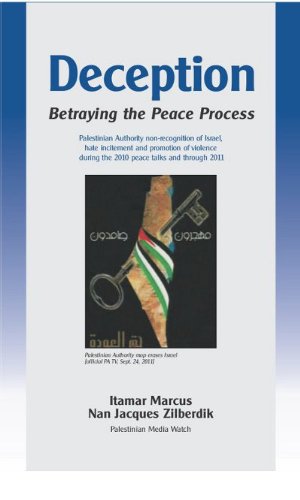There are two layers of media bias when it comes to Israel. The first emanates from the West that focuses on Israel’s “so called” genocidal policies which, because they are not blatantly anti-Semitic are perceived as “legitimate criticism.” The second originates in the Arab-Muslim world. Its accusations are blatantly anti-Semitic and have successfully revived medieval “facts” from the blood libel to the Protocols of the Elders of Zion. But, at the end of the day, both contain and essential layer of anti-Semitism.
Western media bias toward Israel has become one of the main soft power weapons for those who wish to demonize Israel in the public eye and generate negative views of Israel in order to pressure Israel to succumb to Palestinian demands. It is also a pervasive tactic employed by groups like the Boycott, Divestment and Sanctions movement (BDS) and the accepted tactic of Palestinian political warfare against Israel, in addition terror and the “armed struggle.” It is founded on the spurious equation of Zionism with apartheid, which was endorsed by the 2001 World Conference on Racism, Racial Discrimination, Xenophobia and Related Intolerance in Durban, South Africa.
The accusation not only states falsely that Israel is a racist state engaged in war crimes and ethnic cleansing but also demands that international organizations and NGOs shun and isolate it as a step toward its eventual dissolution. The true nature of the BDS movement is effectively incitement to discrimination. That is anti-Semitism.
Itamar Marcus, founder and director of Palestinian Media Watch (PMW) and PMW analyst Nan Jacques Zilberdik, recently published a book entitled, Deception: Betraying the Peace Process that chronicles how Palestinian media has deceived Israel and the West, specifically as it relates to peace with Israel.
Marcus, who founded PMW in 1996, has been working diligently for the past sixteen years to expose the role Palestinian media plays in the molding of public opinion in Palestinian society, namely how the media demonizes Jews and Israelis and producing one of the major obstacles to genuine reconciliation and mutual recognition. His findings provide convincing evidence why Arab-Palestinian rejectionism still surpasses the desire for peace and recognition of the State of Israel.
The authors give an abundance of examples gathered from May 2010, the month that the Obama administration began brokering indirect Israeli-Palestinian talks, lasting through 2011.
Whereas the book is a very useful guide that shows example upon example of the kind of double-speak used in Palestinian media outlets portraying the satanic alliance between the US-Israel, Israel as an apartheid state, as well as countless examples of glorifying Islamist-terror acts that are justified given the target – liberating Palestine and ridding it from Jews.
The book will indeed serve analysts and those who seek verified historical facts. At the same time, it lacks an historical narrative to contextualize the chain of events in the history of the Israeli-Palestinian conflict. A freshman reader of the Israeli-Palestinian conflict would simply see the book as laundry list of egregious offenses without a frame of reference and would miss the significance of the book.
There is no doubt that in the age of social media this book has merit and importance, but in the same way that one cannot explain the history of the Arab-Israeli conflict in a fifty character tweet, it is not enough to pick the low hanging-fruit and serve it up without the necessary historical context.
The battleground of the Israeli-Palestinian conflict is no longer limited to just ground, sea, or air mêlées. Now the boundaries have shifted to include protracted and arduous online initiatives.
Now that the campaign to delegitimize Israel online has become pervasive, Israelis are only beginning to understand the need to win on both fronts — the physical and the virtual. For example, in 2008, Israelis living in the West Bank, when filling out the address section of their Facebook profiles, were shocked to discover that they had to choose “Palestine” as their state, with no option for Israel. In contrast to the much-discussed “facts on the ground,” here was a blatant attempt by Palestinians to revise history by creating “facts” online in order to claim that an area of Israel today is a valid Palestinian state, a state which in reality never existed.
Even more flamboyant confrontations take place daily on Wikipedia, where Palestinians have sown “destroyed villages” and “war crimes” allegations across the map, even to the extent of claiming that Tel Aviv was founded on the ruins of invented villages.
All in all, soft power, that is the ability to influence behavior through values, policies, institutions and culture, as opposed to ‘hard’ or coercive power exercised through military or economic pressure, plays a tremendous role in the Israeli-Palestinian conflict especially when the incitement detailed by Marcus and Zilberdik cascades through Palestinian media outlets into the schools and mosques where the next generation of Palestinian children continue to nurse on the same lies their parents and grandparent were taught.
The facts documented by Deception: Betraying the Peace Process have a great value to the extent they are set within the larger historical context and are recognized as a symptom of the obstinate Arab rejection of a Jewish state. Without this dimension of understanding and truthfulness it will be difficult for Israel to make its case effectively in the court of world public opinion.
Book Review courtesy of the Jewish Political Studies Review, Jerusalem.
Asaf Romirowsky PhD is acting executive director for Scholars for Peace in the Middle East (SPME) and an adjunct scholar at the Middle East Forum and the Foundation for Defense of Democracies.



